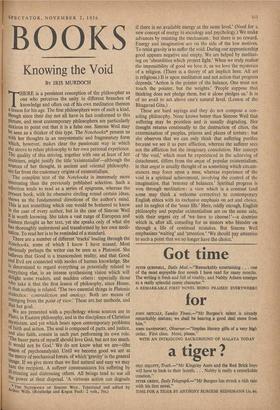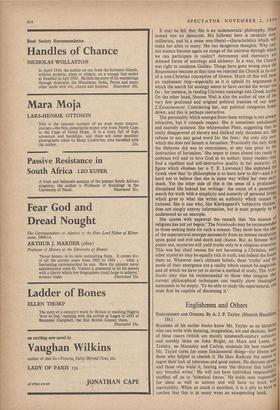BOOKS
Knowing the Void
BY IRIS MURDOCH THERE is a persistent conception of the philosopher as one who perceives the unity in different branches of knowledge and offers out of his own meditation thereon a lesson for his age. The first philosophers were of such a kind, though since their day not all have in fact conformed to this Picture, and most contemporary philosophers are particularly anxious to point out that it is a false one. Simone Well may be seen as a thinker of this type. The Notebooks* present us With her thoughts in an unsystematic and fragmentary form Which, however, makes clear the passionate way in which She strove to relate philosophy to her own personal experience. The quality of this striving, together with one at least of her doctrines,, might justify the title 'existentialist'—although the sources of her thought, in ancient and oriental philosophy. are far from the customary origins of existentialism.
The complete text of the Notebooks is immensely more interesting than the previously published selection. Such a selection tends to read as a series of epigrams, whereas the Present book, with its obsessive circling round certain ideas, This us the fundamental directions of the author's mind. !lk is not something which one would be bothered to know in the case of every author, but in the case of Simone Well it is worth knowing. She takes a vast range of European and Eastern thought as her text, yet she speaks only of what she has thoroughly understood and transformed by her own medi- tation. To read her is to be reminded of a standard.
There are a number of different 'tracks' leading through the Notebooks, some of which I know I have missed. Most obviously perhaps the writer can be seen as a Platonist. She believes that Good is a transcendent reality, and that Good and Evil are connected with modes of human knowledge. She is determined to regard everything as potentially related to everything else, in an intense synthesising vision which will delight some readers, and madden others : especially those who take it that the first lesson of philosophy, since Hume, is that nothing is related. 'The two essential things in Platonic dialectics : contradiction and analogy. Both are means of emerging from the point of view.' These are her methods, and that her goal. We are presented with a psychology whose sources are in Plato, in Eastern philosophy, and in the disciplines of Christian ntYsticism, and yet which bears upon contemporary problems of faith and action. The soul is composed of parts, and justice, and also faith, consist in each part performing its own role. `,The baser parts of myself should love God, but not too much. .!-t would not be God.' We do not know what we are—(the lesson of psychoanalysis). Until we become good we are at the mercy of mechanical forces, of which 'gravity' is the general Irnage. If we give more than we find natural and easy we may .hate the recipient. A sufferer communicates his suffering by ill-treating and distressing others. All beings tend to use all die power at their disposal. 'A virtuous action can degrade ----_____ * THE NOTEBOOKS OF SIMONE WEIL. Translated and edited by Arit".
UX Wills. (Routledge and Kegan Paul: 2 vols., 56s.) if there is no available energy at the same level.' (Need for a new concept of energy in sociology and psychology.) We make advances by resisting the mechanism : but there is no reward. Energy and imagination are on the side of the low motives. To resist gravity is to suffer the void. During our apprenticeship good appears negative and empty. We are helped by meditat- ing on 'absurdities which project light.' When we truly realise the impossibility of good we love it, as we love the mysteries of a religion. (There is a theory of art implicit here. All art is religious.) It is upon meditation and not action that progress depends. 'Action is the pointer of the balance. One must not touch the pointer, but the weights.' People suppose that thinking does not pledge them, but it alone pledges us.' It is of no avail to act above one's natural level. (Lesson of the Bhagavad Gita.) These are hard sayings and they do not compose a con- soling philosophy. None knows better than Simone Well that suffering may be pointless and is usually degrading. Her thought returns continually to the destruction of cities, the extermination of peoples, prisons and places of torture : but she observes that we can only think that suffering purifies because we see it as pure affliction, whereas the sufferer sees not the affliction but the imaginary consolation. Her concept of 'the void,' which must be experienced in the achieving of detachment, differs from the angst of popular existentialism, in that angst is usually thought of as something which circum- stances may force upon a man, whereas experience of the void is a spiritual achievement, involving the control of the imagination, that 'restorer of balances.' Spiritual progress is won through meditation : a view which' is a contrast (and some may think a welcome corrective) to contemporary English ethics with its exclusive emphasis on act and choice. and its neglect of the 'inner life.' Here, oddly enough, English philosophy and popular existentialism are on the same side, with their urgent cry of 'we have to choose !'—a doctrine which is, after all, consoling for us sinners who blunder on through a life of continual mistakes. But Simone Well emphasises 'waiting' and 'attention.' We should pay attention to such a point that we no longer have the choice.' It may be felt that this is an undemocratic philosophy. Plate indeed was no democrat. His follower here is certainly non- utilitarian, and in a sense non-liberal--characteristics which will make her alien to many. She has dangerous thoughts. Why can' not science become again an image of the universe through which we can participate in reality? Astronomy and chemistry are debased forms of astrology and alchemy. In a way, the Church was right to condemn Galileo. Things have gone wrong since the Renaissance because at that time we rejected the Church in favour of a non-Christian conception of Greece. Much of this will have an unpleasant ring—especially as it is upheld by arguments in which the search for analogy seems to have carried the writer too far : for instance, in reading Christian meanings into Greek myths. On the other hand, Simone Weil is also the author of one of the very few profound and original political treatises of our timer L'Enracinement. Considering her, our political categories break down; and this is perhaps instructive. The personality which emerges from these writings is not alwaYs attractive, but it compels respect. She is sometimes unbalanced and scarcely accurate. She whitewashes Plato, suggesting that he really disapproved of slavery and disliked only decadent art. She refuses to say any good word for the Jews : the only city over which she does not lament is Jerusalem. 'Practically the only thing the Hebrews did was to exterminate, at any rate prior to the destruction of Jerusalem.' She seems at times almost too ready to embrace evil and to love God as its author; many readers may find a repellent and self-destructive quality in her austerity. (A figure which obsesses her is T. E. Lawrence.) She endorsed the Greek view that 'to philosophise is to learn how to die'—and it is hard not to believe that she in some way willed her own ear 1Y death. Yet the other side of this is the sense of a profoundly disciplined life behind her writings: the union of a passionate search for truth with a simplicity and austerity of personal living, which gives to what she writes an authority which cannot he imitated. She is one who, like Kierkegaard's 'subjective thinker, does not simply convey information, but is most properly to he understood as an example. She quotes with approval the remark that 'the science of religions has not yet begun.' The Notebooks may be recommended to those seeking hints for such a science. They show how the idea of the supernatural emerges necessarily from an intense meditation upon good and evil and death and chance. But, as Simone Weil points out, mysteries will yield truths only to a religious attention- This was her chief reason for not becoming a Christian, since other mysteries may be equally rich in truth, and indeed she found them so. Whatever one's ultimate beliefs, these 'truths' and the mode of their emergence are a reality which cannot be neglected and of which we have yet to devise a method of study. The Note' books may also be recommended to those who imagine that current philosophical techniques can readily show theologi( al statements to be empty. `To be able to study the supernatural, one must first be capable of discerning it.'



































 Previous page
Previous page